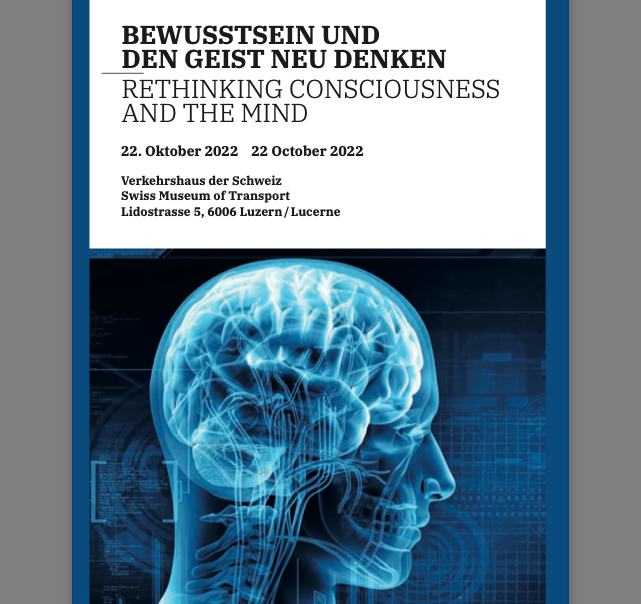On October 22, 2022, IFF director Margaret Wertheim gave a keynote address at the Swiss Biennial on Science, Technics + Aesthetics. This year’s conference theme was Rethinking Consciousness and the Mind.
Wertheim’s talk, titled The Problem of the Problem of Consciousness, looks at the history behind the concept ‘consciousness,’ and charts how this phenomenon came to be sees as a ‘problem’ that science could solve. The talk is based on her acclaimed essay in Aeon magazine “I Feel Therefore I Am.” Wertheim’s conference session is chaired by buddhist scholar Thupten Jinpa Langri.
Other conference speakers include neuroscientist Jill Bolte Taylor (My Stroke of Insight), physicist Fritjof Capra (The Tao of Physics), Tibetan buddhist Thupten Jinpa Langri (translator to the Dalai Lama), and philospher Manfred Folkers (All You Need is Less). Panel discussion moderated by Steve Paulson co-host of the NPR program To The Best Of Our Knowledge.
…
Conference website:
Conference program:
Talk Abstracts and Speakers Bios:
…
Margaret’s Talk Outline: In contemporary neuroscience and philosophy ‘consciousness’ is conceived of as a phenomenological problem in need of an explanation. But how and why did it come to be seen as a “problem”? Medieval people did not sit around debating if we are conscious or how we came to be endowed with this quality. In their worldview, humans were beings were equipped with a soul, which ipso facto had the power to make moral and ethical decisions. Indeed, we were compelled to do so as part of our cosmic duty. With the rise of modern science, however, Western thinking re-worked humans into solely material beings, and psychological phenomena have ever-since been regarded—at least in scientific circles—as a secondary byproduct of the physical workings of the brain. But this deeply materialist position left out the issue of ‘consciousness’—our sense of our selves as distinct psychic entities with free will, feelings, and inner perceptions—what the Medievals called qualia (our apprehension of the redness of an apple or the taste of cinnamon). From the 1970’s on there has been a growing interest among neuroscientists, physicists, philosophers and humanists to make a theoretical home for consciousness. In this talk Wertheim will discuss ‘consciousness’ within an historical context by tracing how the term came to be used as a response to earlier histories of Western thinking about human ‘nature’.
